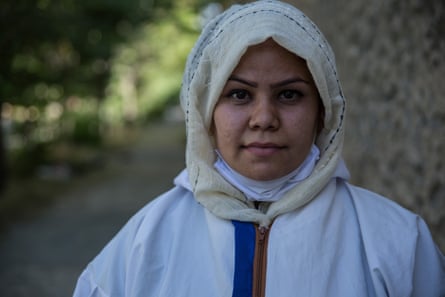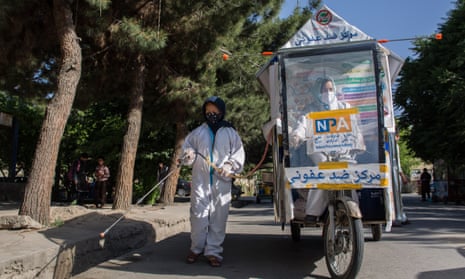Freshta had spent months building up a franchise business to help to feed her family – and break a few taboos on women at the same time – when coronavirus hit Afghanistan.
In November, the engineering student, (who has asked to be identified by one name only) became one of a fleet of female drivers taking 40 Banu’s Kitchen food carts around Kabul, serving up burgers and rice to a predominantly male customer base. “At the beginning, men on the streets would be shocked to see us driving a motorbike and selling food, but after about two or three months, they are now used to it. They even support us,” she says.
Freshta, 19, was paid AFN300 (£3.10) a day, plus a percentage of the profit.
But on 26 March, as the city went into lockdown, Freshta’s business was forced to close. Not only is she the main breadwinner in a household of six in one of the most expensive cities in the country, Freshta is also paying for her education. “My family’s economic condition isn’t very good, and there’s no shame in any work,” she says.
Fortunately, Ebtakar, the social enterprise NGO that helped Freshta and almost 100 other women set up their mobile food-cart franchises, came up with a plan: turn the carts into disinfection units to help people stay safe during the pandemic.
Since April Freshta has driven her cart around the city’s poorer areas, disinfecting cars, shops and community areas and giving out free masks, gloves and sanitiser.

“Now that Covid-19 has shut pretty much all businesses and the city is under quarantine, including our mobile food cart, we use our motorbikes to disinfect the city and protect the people, their cars and the community as a whole,” says Freshta.
“We decided to use the carts we already have to help provide free sanitation services while also keeping the women employed,” says Farhad Wajdi, founder of Ebtakar. The women are paid a daily salary of AFN500, and have protective equipment to wear. The NGO secured funding from the UN and the Afghan government to put the idea into practice.
Afghanistan has been struggling to contain the spread of the coronavirus. By the beginning of June, more than 16,000 cases had been recorded. The UN has raised concerns over the lack of adequate medical facilities and resources that threaten to aggravate the health crisis.
A report by Oxfam International raised concerns about the disproportionate impact of Covid-19 on Afghan women. “Patriarchal norms limit their movement, access to basic rights such as education and health, control over resources, decisions affecting their lives and the right to live free from violence. Covid-19 is proving to be no different and is exacerbating the inequalities Afghan women face,” the report notes
“Women’s decreased ability to earn money during the Covid-19 outbreak severely limits their economic and social independence. The loss of these employment opportunities is extremely worrying as bringing an extra income into the family has acted as the key justification to allow women to leave the house,” it continues.
Before Covid-19, the carts around the city were already tackling taboos. It is rare to see women driving motorbikes, and it’s highly unusualfor a stall to be run by a woman in Kabul’s vibrant street food scene.

“There is social stigma attached to working women in Afghanistan that [bars] them from equal economic opportunities, especially in certain sectors such as serving street food,” says Wajdi. “We wanted to encourage more Afghan women to feel unrestricted while choosing their career paths or businesses which are typically considered for men.”
For Freshta the work has been a financial relief and seen a change in attitudes. “It is true that women are not always welcomed when they are working outside. Since I started the mobile food cart, I noticed people who would harass us, but eventually they had to accept that we are working here,” she says.
“People would be shocked to see women working on the street, but now they salute us.”
